高中英语 人教版 必修二Unit 5 单元检测题
- 格式:doc
- 大小:75.00 KB
- 文档页数:10
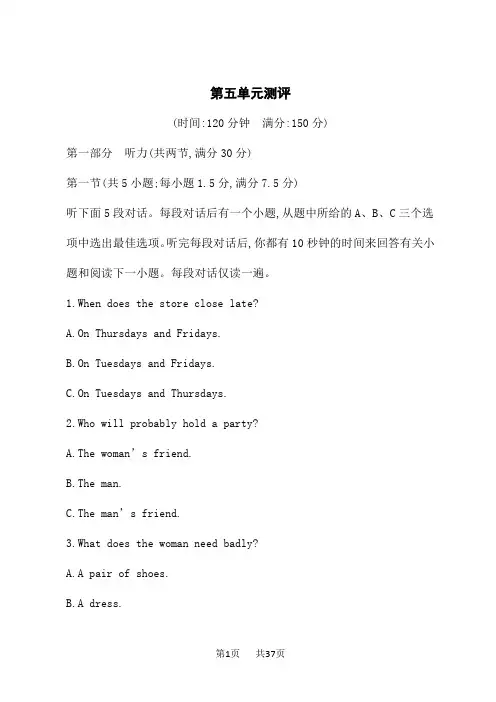
第五单元测评(时间:120分钟满分:150分)第一部分听力(共两节,满分30分)第一节(共5小题;每小题1.5分,满分7.5分)听下面5段对话。
每段对话后有一个小题,从题中所给的A、B、C三个选项中选出最佳选项。
听完每段对话后,你都有10秒钟的时间来回答有关小题和阅读下一小题。
每段对话仅读一遍。
1.When does the store close late?A.On Thursdays and Fridays.B.On Tuesdays and Fridays.C.On Tuesdays and Thursdays.2.Who will probably hold a party?A.The woman’s friend.B.The man.C.The man’s friend.3.What does the woman need badly?A.A pair of shoes.B.A dress.C.A cupboard.4.What are the speakers doing?A.Enjoying their honeymoon.B.Attending a wedding.C.Seeing a movie.5.What did the woman do last night?A.She gave her mother a gift.B.She danced with her friend.C.She did some shopping.第二节(共15小题;每小题1.5分,满分22.5分)听下面5段对话或独白。
每段对话或独白后有几个小题,从题中所给的A、B、C三个选项中选出最佳选项。
听每段对话或独白前,你将有时间阅读各个小题,每小题5秒钟;听完后,各小题将给出5秒钟的作答时间。
每段对话或独白读两遍。
听第6段材料,回答第6、7题。
6.Why does Mike call Mary?A.To remind her of the trip.B.To invite her parents to the trip.C.To ask her to hand in the report.7.What day is it today?A.Wednesday.B.Friday.C.Sunday.听第7段材料,回答第8、9题。
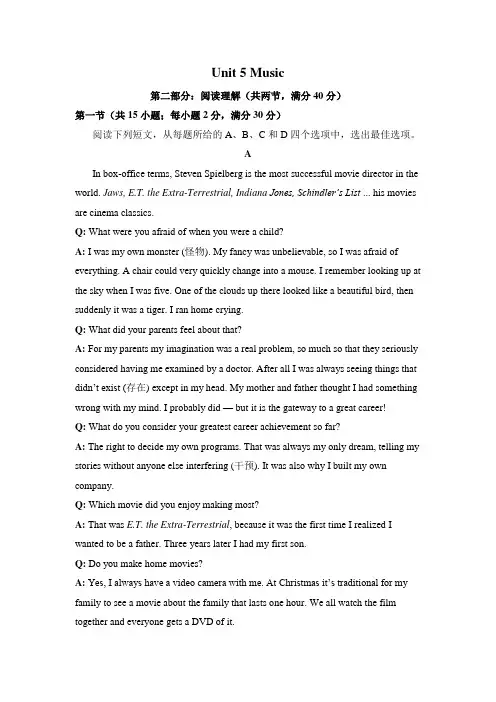
Unit 5 Music第二部分:阅读理解(共两节,满分40分)第一节(共15小题;每小题2分,满分30分)阅读下列短文,从每题所给的A、B、C和D四个选项中,选出最佳选项。
AIn box-office terms, Steven Spielberg is the most successful movie director in the world. Jaws, E.T. the Extra-Terrestrial, Indiana Jones, Schindler’s List ... his movies are cinema classics.Q: What were you afraid of when you were a child?A: I was my own monster (怪物). My fancy was unbelievable, so I was afraid of everything. A chair could very quickly change into a mouse. I remember looking up at the sky when I was five. One of the clouds up there looked like a beautiful bird, then suddenly it was a tiger. I ran home crying.Q: What did your parents feel about that?A: For my parents my imagination was a real problem, so much so that they seriously considered having me examined by a doctor. After all I was always seeing things that didn’t exist (存在) except in my head. My mother and father thought I had something wrong with my mind. I probably did — but it is the gateway to a great career!Q: What do you consider your greatest career achievement so far?A: The right to decide my own programs. That was always my only dream, telling my stories without anyone else interfering (干预). It was also why I built my own company.Q: Which movie did you enjoy making most?A: That was E.T. the Extra-Terrestrial, because it was the first time I realized I wanted to be a father. Three years later I had my first son.Q: Do you make home movies?A: Yes, I always have a video camera with me. At Christmas it’s traditional for my family to see a movie about the family that lasts one hour. We all watch the film together and everyone gets a DVD of it.21. What did Spielberg’s parents think about his imagination?A. It was quite acceptable.B. They were worried about it.C. They paid no attention to it.D. It was the gateway to his success.22. What is most important to Spielberg?A. Creation.B. His family.C. His company.D. Artistic freedom.23. Where is the text most likely to have been taken from?A. A news report.B. An interview.C. A lesson plan.D. A movie review.BTonya, Elsa and Mark are students at LaGuardia High School in New York City. It’s a school with regular academic (学术的) classes, but it also gives special attention to the performing arts. Tonya likes dancing, Elsa wants to be an artist and Mark is a singer.The students are all 15, and they’re in 10th grade. They study subjects like English, math, social studies, science and PE. They also choose a foreign language: French, Italian, Spanish or Japanese. Students have many academic classes, but during the school day they also take classes in the arts, like theater, art, dance and music. Mark says, “I get the basic classes, but I also take a voice class and a music history class.”There is even more for LaGuardia students after school. There are more than 40 clubs for students. For example, there’s a movie club, a music club and an environment club. “We have so many choices here,” says Tonya. “My favorite club isthe camera club. I like taking photos. It’s also a great way to m eet people with common interests.”Students at LaGuardia can also do many sports. For example, they can play basketball, tennis, volleyball and soccer. Elsa is on the gymnastics team. She says, “I like being on a team. It makes me work hard and do my best.” Students practice after school. They compete against other high schools. Mark says, “At school, I study by myself. I’m a singer, and I do that alone, too. That’s why I like playing on the basketball team. We work together and compete against other teams.”LaGuardia offers many great classes, clubs and sports for students. Students at LaGuardia get a good education and they also develop their own interests. Many LaGuardia students become dancers, singers and actors!24. What do we know about LaGuardia High School?A. Students take art classes at night.B. It places great importance on arts.C. Students have few subjects to choose from.D. It aims to develop students’ language skills.25. Which club does Tonya like most?A. The movie club.B. The music club.C. The camera club.D. The environment club.26. Why does Mark enjoy playing on the basketball team?A. He likes teamwork.B. It makes him try his best.C. He hopes to build up his health.D. It helps him make more friends.27. What is the best title for the text?A. Education in New YorkB. School Life at LaGuardiaC. Top Students at LaGuardiaD. LaGuardia’s After-school ActivitiesCNashville, Tennessee — nicknamed (绰号) Music City — is known as a center of country music. The city will soon become even more musical. Construction (建设) of the National Museum of African-American Music (NMAAM) will begin this year. NMAAM’s aim is to celebrate the more than 50 music styles that African Americans have created or influenced.“Whether you’re talking about countr y, blues, R&B, jazz, even rock and roll, the odds (可能性) are pretty high that it’s African American in its beginnings,” NMAAM president and CEO Henry Hicks says.The museum is due to open in 2019. Visitors will have many chances to explore and learn. They will be able to enjoy musical performances and learn the history behind the music. They will be able to record their own songs and try out dance moves.NMAAM is already offering programs, including a summer music camp heldat Tennessee State University, in Nashville. The most interesting part for camper Matthew Mueller, 10, was when Lucius “Spoonman” Talley played the spoons, a creative way to make music.“People started using spoons because they were something that all people had. Not everybody could afford instruments,” Matthew says.Matthew’s grandmother, Karen Mueller, is a music teacher. She is excited about the museum teaching people about the many styles of African-American music. “There is such a rich history of music that African Americans have broug htto America and to the world,” she says. “I hope that people will come to Nashville not only to see all the country music things that go on but to visit this resource as well.”28. Why will Nashville become more musical?A. Because there will be a yearly musical celebration.B. Because it will popularize some new music styles.C. Because many musical programs will be held there.D. Because NMAAM will be built there soon.29. What do Henry’s words mean?A. There are various kinds of music.B. Music is the root of African Americans.C. People should know more about the history of music.D. African Americans have played an important role in music.30. What is Karen’s attitude towards NMAAM?A. Uncaring.B. Unclear.C. Supportive.D. Disappointed.31. What does the underlined part “this resource” in the last paragraph refer to?A. NMAAM.B. Nashville.C. The countryside.D. Karen’s school.DLily Martin-Babin, 16, who lives in Blenheim, New Zealand, won the nationwide Warehouse Stationery (文具) Cool Cover Competition with her design of native birds painted as sports accessories (体育用品), after seeing off competition from hundreds of other hopefuls.Her eye-catching design will appear on the front cover of school exercise books which will be sold by Warehouse Stationery. All money from the sale of books will go to the Warehouse Stationery Scholarship Fund (教育基金). The fund is a partnership between Warehouse Stationery and another organization, providing scholarships for six young New Zealanders who would otherwise not have been able to afford postsecondary education.Lily’s design caught the eye of competition judge Kees Meeuws, who is a former Otago Highlanders coach and artist.Lily, a student from Marlborough Girls’ College, says she came up with the idea while drawing rugby (橄榄球) balls for her entry (参赛作品). Her winning design includes a pukeko as a table tennis bat, a weka as a basketball, a kakapo as a tennis ball, a fantail as a badminton shuttlecock and a kiwi as a rugby ball.“So I built upon this rugb y ball drawing and drew a kiwi and it worked surprisingly well. I then tried it with other native birds and they also turned out pretty great. I was surprised when I found out that I’d won, I was so happy and immediately told my family and friends,” Lily s ays.“I hope to one day have a career in art. I’m excited to know that the public can buy my design so my art becomes part of New Zealand school life.”Lily won an iPad and $500 as the winner of this competition.32. What do we know about Lily’s design?A. It is an advertisement for the competition.B. It may be sold at a high price at an art show.C. It can help a company sell sports accessories.D. It will become the cover of school exercise books.33. Who can get help from the competition?A. Several artists.B. Lily’s schoolmates.C. Some needy students.D. Lily’s family and friends.34. In Kees’eyes, Lily’s artwork is _____.A. family-friendlyB. attractiveC. childishD. strange35. Which can be used to describe Lily’s feelings now?A. She is satisfied with the prize.B. She is uncertain about her future.C. She is proud of her achievement.D. She is doubtful of the competition result.第二节(共5小题;每小题2分,满分10分)根据短文内容,从短文后的选项中选出能填入空白处的最佳选项。
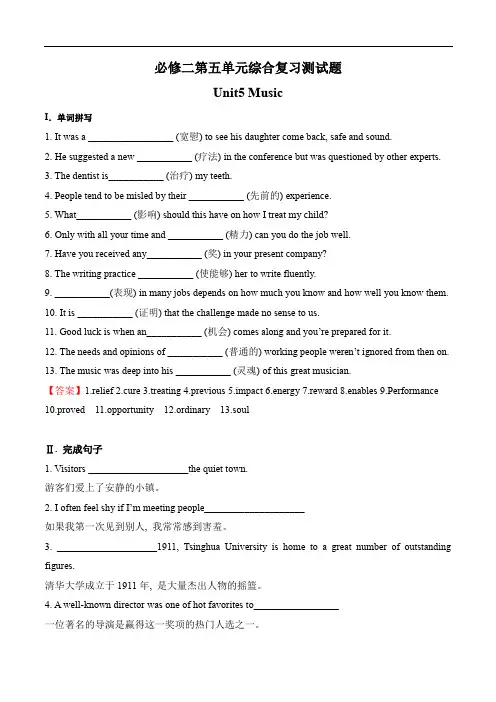
必修二第五单元综合复习测试题Unit5 MusicI.单词拼写1. It was a _________________ (宽慰) to see his daughter come back, safe and sound.2. He suggested a new ___________ (疗法) in the conference but was questioned by other experts.3. The dentist is___________ (治疗) my teeth.4. People tend to be misled by their ___________ (先前的) experience.5. What___________ (影响) should this have on how I treat my child?6. Only with all your time and ___________ (精力) can you do the job well.7. Have you received any___________ (奖) in your present company?8. The writing practice ___________ (使能够) her to write fluently.9. ___________(表现) in many jobs depends on how much you know and how well you know them.10. It is ___________ (证明) that the challenge made no sense to us.11. Good luck is when an___________ (机会) comes along and you’re prepared for it.12. The needs and opinions of ___________ (普通的) working people weren’t ignored from then on.13. The music was deep into his ___________ (灵魂) of this great musician.【答案】1.relief 2.cure 3.treating 4.previous 5.impact 6.energy 7.reward 8.enables 9.Performance 10.proved 11.opportunity 12.ordinary 13.soulⅡ. 完成句子1. Visitors ____________________the quiet town.游客们爱上了安静的小镇。
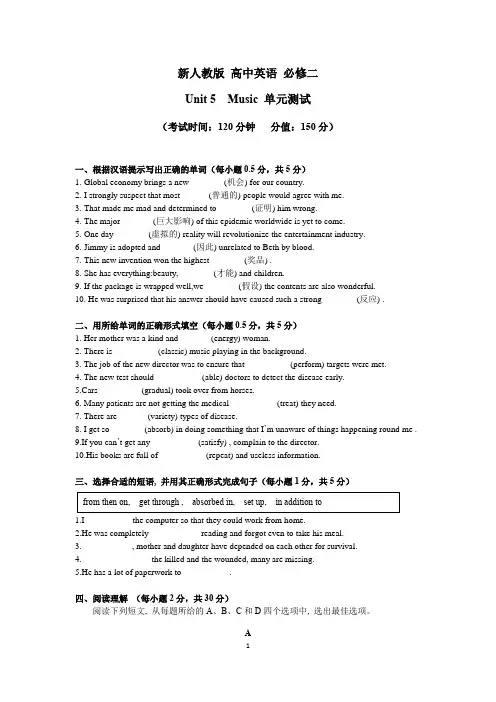
新人教版高中英语必修二Unit 5 Music 单元测试(考试时间:120分钟分值:150分)一、根据汉语提示写出正确的单词(每小题0.5分,共5分)1.Global economy brings a new _______ (机会) for our country.2.I strongly suspect that most ______(普通的) people would agree with me.3.That made me mad and determined to _______ (证明) him wrong.4.The major _______(巨大影响) of this epidemic worldwide is yet to come.5.One day _______ (虚拟的) reality will revolutionize the entertainment industry.6.Jimmy is adopted and _______(因此) unrelated to Beth by blood.7.This new invention won the highest _______ (奖品) .8.She has everything:beauty, _______ (才能) and children.9.If the package is wrapped well,we _______ (假设) the contents are also wonderful.10. He was surprised that his answer should have caused such a strong _______ (反应) .二、用所给单词的正确形式填空(每小题0.5分,共5分)1. Her mother was a kind and _______(energy) woman.2. There is __________(classic) music playing in the background.3. The job of the new director was to ensure that __________(perform) targets were met.4. The new test should __________ (able) doctors to detect the disease early.5.Cars _________ (gradual) took over from horses.6. Many patients are not getting the medical __________ (treat) they need.7. There are ______ (variety) types of disease.8. I get so _______ (absorb) in doing something that I’m unaware of things happening round me .9.If you can’t get any __________ (satisfy) , complain to the director.10.His books are full of __________ (repeat) and useless information.三、选择合适的短语, 并用其正确形式完成句子(每小题1分,共5分)from then on, get through , absorbed in, set up, in addition to1.I __________ the computer so that they could work from home.2.He was completely ___________ reading and forgot even to take his meal.3. ___________, mother and daughter have depended on each other for survival.4. _______________ the killed and the wounded, many are missing.5.He has a lot of paperwork to __________ .四、阅读理解(每小题2分,共30分)阅读下列短文, 从每题所给的A、B、C和D四个选项中, 选出最佳选项。
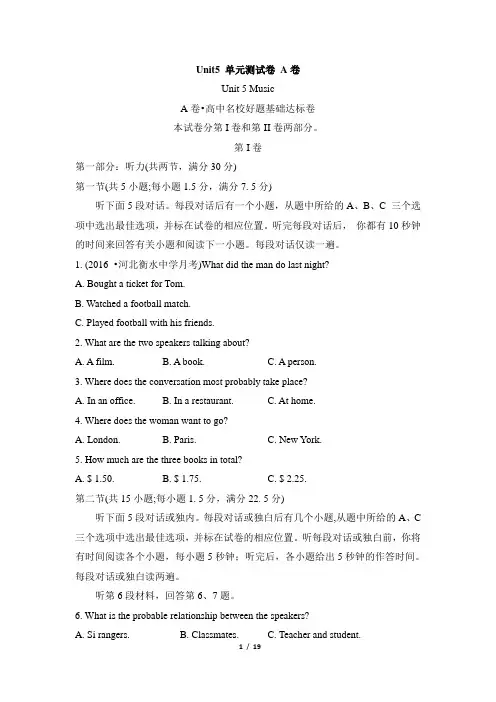
Unit5 单元测试卷A卷Unit 5 MusicA卷•高中名校好题基础达标卷本试卷分第I卷和第II卷两部分。
第I卷第一部分:听力(共两节,满分30分)第一节(共5小题;每小题1.5分,满分7. 5分)听下面5段对话。
每段对话后有一个小题,从题中所给的A、B、C 三个选项中选出最佳选项,并标在试卷的相应位置。
听完每段对话后,你都有10秒钟的时间来回答有关小题和阅读下一小题。
每段对话仅读一遍。
1. (2016 •河北衡水中学月考)What did the man do last night?A. Bought a ticket for Tom.B. Watched a football match.C. Played football with his friends.2. What are the two speakers talking about?A. A film.B. A book.C. A person.3. Where does the conversation most probably take place?A. In an office.B. In a restaurant.C. At home.4. Where does the woman want to go?A. London.B. Paris.C. New York.5. How much are the three books in total?A. $ 1.50.B. $ 1.75.C. $ 2.25.第二节(共15小题;每小题1. 5分,满分22. 5分)听下面5段对话或独内。
每段对话或独白后有几个小题,从题中所给的A、C 三个选项中选出最佳选项,并标在试卷的相应位置。
听每段对话或独白前,你将有时间阅读各个小题,每小题5秒钟;听完后,各小题给出5秒钟的作答时间。
每段对话或独白读两遍。
听第6段材料,回答第6、7题。
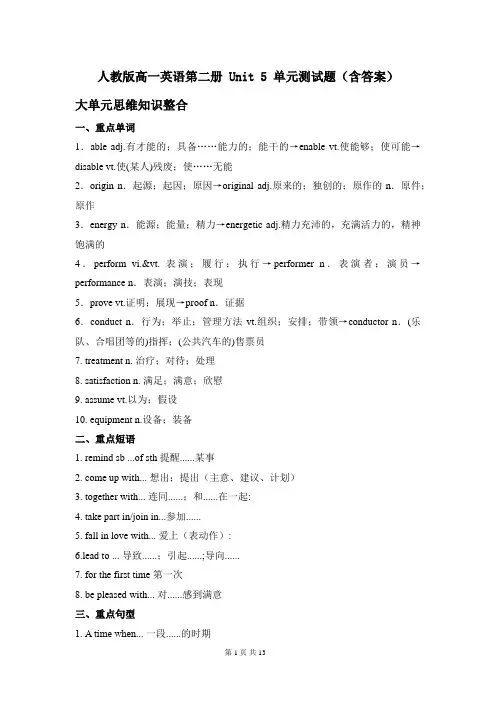
人教版高一英语第二册 Unit 5 单元测试题(含答案)大单元思维知识整合一、重点单词1.able adj.有才能的;具备……能力的;能干的→enable vt.使能够;使可能→disable vt.使(某人)残废;使……无能2.origin n.起源;起因;原因→original adj.原来的;独创的;原作的 n.原件;原作3.energy n.能源;能量;精力→energetic adj.精力充沛的,充满活力的,精神饱满的4.perform vi.&vt. 表演;履行;执行→performer n.表演者;演员→performance n.表演;演技;表现5.prove vt.证明;展现→proof n.证据6.conduct n.行为;举止;管理方法vt.组织;安排;带领→conductor n.(乐队、合唱团等的)指挥;(公共汽车的)售票员7. treatment n. 治疗;对待;处理8. satisfaction n. 满足;满意;欣慰9. assume vt.以为;假设10. equipment n.设备;装备二、重点短语1. remind sb ...of sth 提醒......某事2. come up with... 想出;提出(主意、建议、计划)3. together with... 连同......;和......在一起:4. take part in/join in...参加......5. fall in love with... 爱上(表动作):6.lead to ... 导致......;引起......;导向......7. for the first time 第一次8. be pleased with... 对......感到满意三、重点句型1.A time when... 一段......的时期2.so....that....如此......以至于,引导结果状语从句四、重点用法1.Virtual choir members record themselves while they perform alone on video.虚拟合唱团成员在独自表演时录制视频。
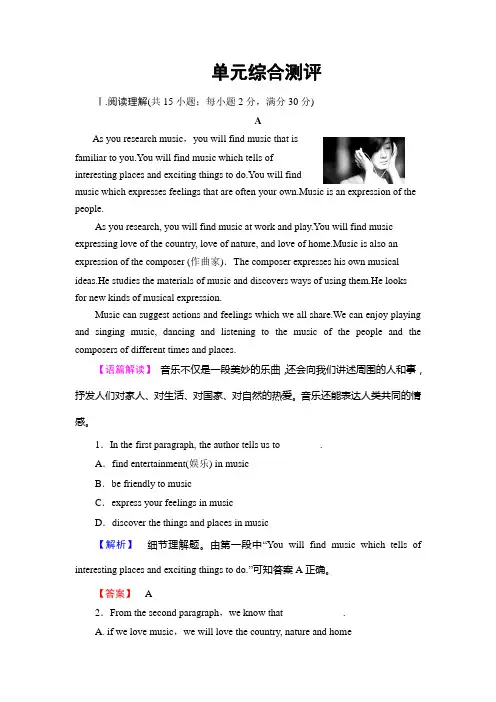
单元综合测评Ⅰ.阅读理解(共15小题;每小题2分,满分30分)AAs you research music,you will find music that isfamiliar to you.You will find music which tells ofinteresting places and exciting things to do.You will findmusic which expresses feelings that are often your own.Music is an expression of the people.As you research, you will find music at work and play.You will find music expressing love of the country, love of nature, and love of home.Music is also an expression of the composer (作曲家).The composer expresses his own musical ideas.He studies the materials of music and discovers ways of using them.He looksfor new kinds of musical expression.Music can suggest actions and feelings which we all share.We can enjoy playing and singing music, dancing and listening to the music of the people and the composers of different times and places.【语篇解读】音乐不仅是一段美妙的乐曲,还会向我们讲述周围的人和事,抒发人们对家人、对生活、对国家、对自然的热爱。
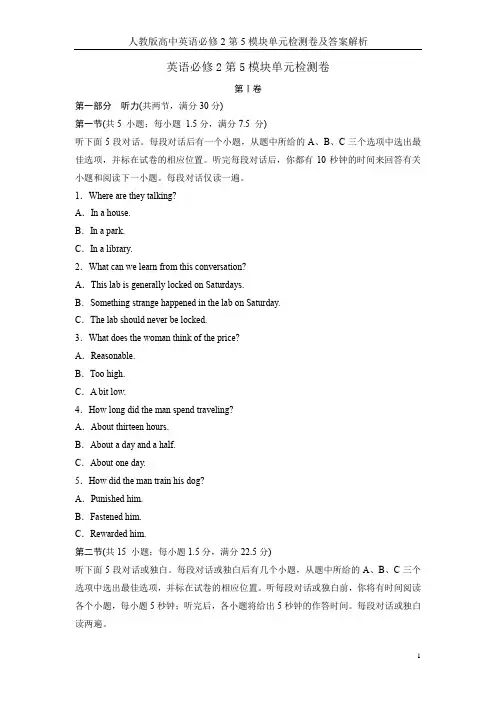
英语必修2第5模块单元检测卷第Ⅰ卷第一部分听力(共两节,满分30分)第一节(共5 小题;每小题 1.5分,满分7.5 分)听下面5段对话。
每段对话后有一个小题,从题中所给的A、B、C三个选项中选出最佳选项,并标在试卷的相应位置。
听完每段对话后,你都有10秒钟的时间来回答有关小题和阅读下一小题。
每段对话仅读一遍。
1.Where are they talking?A.In a house.B.In a park.C.In a library.2.What can we learn from this conversation?A.This lab is generally locked on Saturdays.B.Something strange happened in the lab on Saturday.C.The lab should never be locked.3.What does the woman think of the price?A.Reasonable.B.Too high.C.A bit low.4.How long did the man spend traveling?A.About thirteen hours.B.About a day and a half.C.About one day.5.How did the man train his dog?A.Punished him.B.Fastened him.C.Rewarded him.第二节(共15 小题;每小题1.5分,满分22.5分)听下面5段对话或独白。
每段对话或独白后有几个小题,从题中所给的A、B、C三个选项中选出最佳选项,并标在试卷的相应位置。
听每段对话或独白前,你将有时间阅读各个小题,每小题5秒钟;听完后,各小题将给出5秒钟的作答时间。
每段对话或独白读两遍。
听第6段材料,回答第6、7题。
6.How does the woman feel about the interview with MIT? A.Disappointed.B.Nervous.C.Satisfied.7.What does the man’s father want him to be?A.An English teacher.B.A doctor.C.A historian(历史学家).听第7段材料,回答第8至10题。
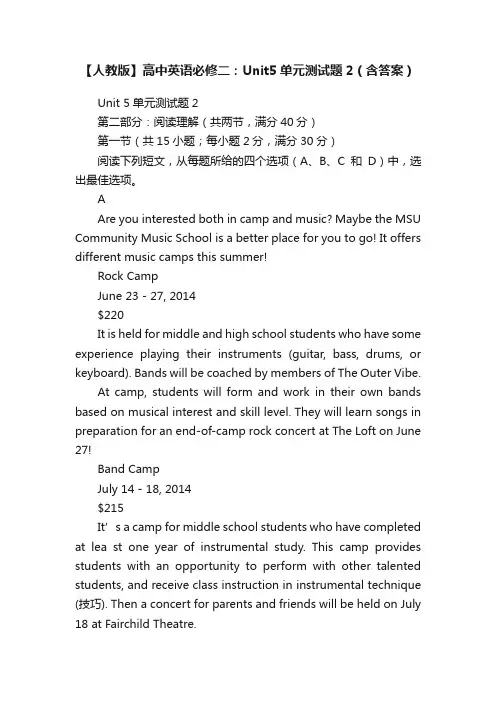
【人教版】高中英语必修二:Unit5单元测试题2(含答案)Unit 5单元测试题2第二部分:阅读理解(共两节,满分40分)第一节(共15小题;每小题2分,满分30分)阅读下列短文,从每题所给的四个选项(A、B、C和D)中,选出最佳选项。
AAre you interested both in camp and music? Maybe the MSU Community Music School is a better place for you to go! It offers different music camps this summer!Rock CampJune 23 - 27, 2014$220It is held for middle and high school students who have some experience playing their instruments (guitar, bass, drums, or keyboard). Bands will be coached by members of The Outer Vibe.At camp, students will form and work in their own bands based on musical interest and skill level. They will learn songs in preparation for an end-of-camp rock concert at The Loft on June 27!Band CampJuly 14 - 18, 2014$215It’s a camp for middle school students who have completed at lea st one year of instrumental study. This camp provides students with an opportunity to perform with other talented students, and receive class instruction in instrumental technique (技巧). Then a concert for parents and friends will be held on July 18 at Fairchild Theatre.Musical Theatre CampJuly 14 - 25, 2014$300 for Grades 9-12$220 for Grades 2-8This camp is held for elementary, middle and high school students. Campers in grades 9-12 will spend the full two weeks developing skills including voicedevelopment, dancing, and prop (道具) design. Campers in grades 2-8 will join them in the second week, and the camp will give a final performance featuring scenes and songs from many popular musicals.Beginning Strings (弦乐器) CampAugust 4 - 8, 2014$185This camp will introduce violins, violas and cellos (中提琴和大提琴) to children ages 6-12. It will give the students instructions by professional string teachers, along with singing and music theory games. Instruments are provided by CMS through a donation by Marshall Music Co. for students who do not have one. At the end of the camp, there will be a final performance to show what the students have learned.21. If a sixth-grader wants to take part in a camp about musicals, how much will he spend?A. $185.B. $215.C. $220.D. $300.22. What do the four camps have in common?A. They all invite some famous stars to teach.B. They are all open to students in all grades.C. They are all organized by Marshall Music Co.D. They all include an end-of-camp performance.23. The author writes this text mainly to encourage students to _____.A. take part in the music campsB. learn different kinds of musicC. have a wonderful summer holidayD. visit the MSU Community Music SchoolBSuppose someone asks you to paint a picture. “All right,” you think. “No problem. I can fill the paper pretty easily.” But what if the picture you are asked to paint is three stories high, two city blocks long, and one block wide? In other words, a total of 17,000 square feet! Most people would be overwhelmed by the request. But not Diego Rivera.Diego Rivera (1886-1957) was one of modern Mexico’s most famous painters. When he was asked to paint this huge picture, he knew he could do it. During his life, Rivera painted 124 frescos that showed Mexican life, history, and social problems. A fresco is a painting on wet plaster (灰泥).Rivera had to plan ahead and drew simply about what he planned to paint. Then Rivera’s assistants would put all but the final layer (层) of plaster on the wall. Next, they used sharp tools to dig the outline of Rivera’s quickly-made drawing into the plaster. Then, they made a mixture of lime (石灰) and sand and spread this over the outline in a thin layer. As soon as this layer was firm — but not dry — Rivera began to paint. Every morning, his paints had to be freshly mixed. Rivera would paint as long as there was daylight. He refused to paint under man-made light since it would change how the colors looked.Sometimes, Rivera would say that what he had painted that day was not good enough. Then he would insist that all the plaster be cut off so he could start again! It took Rivera years to finish, but this fresco is thought to be one of the greatest in the world. The man himself is considered to be the greatest Mexican artist of the twentieth century.24. What would most people think about the request of painting the huge picture?A. It is possible.B. It is pretty easy.C. It is interesting.D. It is too difficult.25. The third paragraph is about _____.A. how Rivera mixed different paintsB. how Rivera chose his assistantsC. how Rivera did his paintingD. how Rivera became famous26. What can we learn about Diego Rivera?A. He wanted everything to be perfect.B. He liked using light in his paintings.C. He preferred quickly-made drawings.D. He was good at making full use of his time.CThe American screen has long been a smoky place. But cigarettes are more common in movies today than at any other time in the last 50 years. According to a survey by the University of California, San Francisco, 75% of all Hollywood films released between 1999 and 2006 showed tobacco (烟草) use.Sadly, audiences — especially kids — are taking notice. Two recent studies show that among children as young as 10, thosewho always see smoking in the movies are up to 2.7 times more likely than others to pick up the habit. Kids from non-smoking homes are hit the hard est. This could be because they don’t live with the dirty ashtrays (烟灰缸) that make real-world smoking a lot less attractive than the cleaned-up movie version.“Seeing smoking on-screen makes it look normal,” says Jono Polansky, whowo rks with a project ca lled Smoke Free Movies. “It says, ‘If you want to be an adult, you’ll smoke,’” Polansky told TFK (Time for Kids). Before you go to the movies, check out /doc/2211627086.htmlfor an updated list of which movies show smoking.More gr oups than ever are pushing to get the smokes off of the screen. “Some movies show kids up to 14 incidents of smoking per hour,” says Barry Bloom, head of the Harvard School of Public Health. “We’re in the business of preventing disease, and cigarettes are the Numb er 1 preventable cause.”Pressure (压力) is growing to make movies a non-smoking zone. A dozen health groups, including the American Medical Association, are calling for a reduction of smoking in movies and on TV. Forty-one state attorneys general (州总检察长) have agreed to add an anti-tobacco public service ad at the beginning of any DVD that includes smoking.Like former smokers, movie studios may realize that getting out of the habit is not just a lot healthier, but also a lot smarter.27. The underlin ed part “the habit” in Paragraph 2 refers to _____.A. smokingB. studyingC. taking noticeD. seeing a movie28. Jono Polansky probably advises kids to _____.A. act like an adultB. go to the moviesC. see smoke-free moviesD. work for Smoke Free Movies29. The move to make movies a non-smoking zone _____.A. is impossible to succeedB. is under a lot of pressureC. has proved to be a failureD. has received official support30. What would be the best title for the text?A. Movies are becoming less and less attractiveB. Kids should see fewer and fewer moviesC. Movies may be bad for kids’ healthD. Smoking is harmful to kids’ healthDNewborns begin to develop language skills long before they begin speaking. And, compared to adults, they develop these skills more quickly. People have a hard time learning new languages as they grow older, but babies have the ability to learn any language easily.For a long time, scientists have tried to explain how such young children can learn the complicated (复杂的) grammatical rules and sounds of a language. Now, researchers are getting a better idea of what’s happening in the brains of the tiniest language learners. This new information might help kids with learning problems as well as adults who want to learn new languages. It might even help scientists who are trying to design computers that can communicate like people do.Most babies go “ma ma” by 6 months of age, and most children speak in full sentences by age 3. For many years, scientists have wondered how the brains ofyoung children figure out how to communicate using language. With help from new technologies, scientists are now finding that babies begin life with the ability to learn any language. They get into contact (接触) with other people, listen to what they say and watch their movements very closely. That is why they quickly master the languages they hear most often.Studies show that, up to about 6 months of age, babies can recognize all the sounds that make up all the languages in the world. Starting at around 6 mont hs old a baby’s brain focuses on (集中于) the most common sounds it hears. Then, children begin responding only to the sounds of the language they hear the most.In a similar way older babies start recognizing the patterns that make up the rules of their native language. For example, English children who are about 18 months old start to figure out that words ending in “-ing” or “-ed” are usually verbs, and that verbs are action words.31. Which of the following opinions does the author agree with?A. Babies are really good language learners.B. Adults should learn languages like babies.C. It’s better to learn a new language at an early age.D. Babies should be trained to improve language skills.32. The new research in the second paragraph can be helpful in _____.A. finding successful language learnersB. teaching kids with learning problemsC. designing human-shaped computersD. improving babies’ language ability33. The researchers found out that babies learn a language mainly by _____.A. repeating the words of other peopleB. remembering the full sentences they hearC. hearing and closely watching others speakD. figuring out the meaning of different sounds34. In the last two paragraphs, the author explains _____.A. why babies pay more attention to soundsB. how babies respond to what they hear most oftenC. why verbs in a language attract the most attention of a babyD. how babies master the grammatical rules of their native language35. The purpose of the text is to _____.A. discussB. educateC. informD. entertain第二节(共5小题;每小题2分,满分10分)根据短文内容,从短文后的选项中选出能填入空白处的最佳选项。
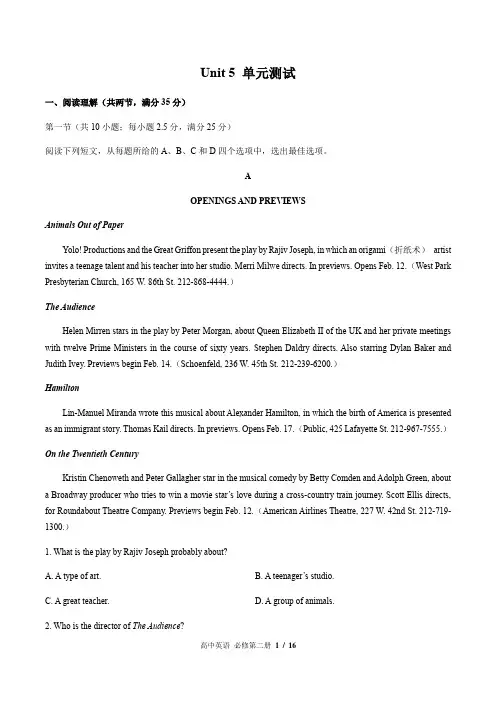
Unit 5 单元测试一、阅读理解(共两节,满分35分)第一节(共10小题;每小题2.5分,满分25分)阅读下列短文,从每题所给的A、B、C和D四个选项中,选出最佳选项。
AOPENINGS AND PREVIEWSAnimals Out of PaperYolo! Productions and the Great Griffon present the play by Rajiv Joseph, in which an origami(折纸术)artist invites a teenage talent and his teacher into her studio. Merri Milwe directs. In previews. Opens Feb. 12.(West Park Presbyterian Church, 165 W. 86th St. 212-868-4444.)The AudienceHelen Mirren stars in the play by Peter Morgan, about Queen Elizabeth II of the UK and her private meetings with twelve Prime Ministers in the course of sixty years. Stephen Daldry directs. Also starring Dylan Baker and Judith Ivey.Previews begin Feb. 14.(Schoenfeld, 236 W. 45th St. 212-239-6200.)HamiltonLin-Manuel Miranda wrote this musical about Alexander Hamilton, in which the birth of America is presented as an immigrant story. Thomas Kail directs. In previews. Opens Feb. 17.(Public, 425 Lafayette St. 212-967-7555.)On the Twentieth CenturyKristin Chenoweth and Peter Gallagher star in the musical comedy by Betty Comden and Adolph Green, about a Broadway producer who tries to win a movie star’s love during a cross-country train journey. Scott Ellis directs, for Roundabout Theatre Company. Previews begin Feb. 12.(American Airlines Theatre, 227 W. 42nd St. 212-719-1300.)1. What is the play by Rajiv Joseph probably about?A. A type of art.B. A teenager’s studio.C. A great teacher.D. A group of animals.2. Who is the director of The Audience?A. Helen Mirren.B. Peter Morgan.C. Dylan Baker.D. Stephen Daldry.3. Which play will you go to if you are interested in American history?A. Animals Out of PaperB. The Audience.C. Hamilton.D. On the Twentieth CenturyBMichael Jackson was on the road of performing when he was five years old. As is known to all, the road to fame and fortune is a long, hard one.Michael remembers those early years when he was young. “My father was a machine operator,” he explained, “and he worked at a steel plant. My mother worked at Sears, a big department store. But they were both musicians.”Michael’s father Joe Jackson realized his sons had a lot of talent, and he knew he could train them to become fine musicians. In those days there were plenty of music groups and some of them were very good. He knew if his sons were to stand out, they would have to be the best.Practice makes perfect. And the Jackson boys practiced! Gradually the group took shape. Then word of this group began to get around. Thus Michael got a chance to do some solo(独唱)songs. In the following years, Michael was always on the top. One million records of his were sold in New Zealand, which has only a total population of three million!When Michael was eighteen, he entered another field of his career(生涯)—acting. “I plan to star in movies,” he told his friends, “but of course, my first love is music.”Michael wrote a lot of his own songs. “Songs came about in the strangest ways,” he said. “I’ll just wake up from sleeping and there is a whole song coming into my head. And then I put it down on the paper.”Still, with all his success, Michael managed to keep his head calm. “I just do a different job from other people,” he said, “but it doesn’t make me think I’m better than other people.”To be quite honest, his fans just love to hear and watch him!4. What can we know from the text?A. Michael Jackson’s parents enjoyed music a lot.B. Michael’s mother worked in a factory when he was young.C. Michael’s father spent a lot of time in drinking.D. Michael began to earn money when he was only four years old.5. What did Joe Jackson realize?A. His children didn’t need much practice.B. His children had little talent to be musicians.C. His children couldn’t become famous if they weren’t the best.D. There were a number of music groups in those days.6. Which of the following is true?A. A great number of New Zealanders bought a record of Michael’s.B. Michael began to act in films when he was five years old.C. All of Michael’s songs were written by other people.D. Michael thinks that he is much more clever than others.7. What’s the main idea of the text?A. How Mr. Jackson trained his children.B. How the Jacksons became successful.C. Why Michael is so popular all over the world.D. How Michael becomes so popular all over the world.CSalvador Dali(1904 —1989)was one of the most popular of modern artists. The Pompidou Centre in Paris is showing its respect and admiration for the artist and his powerful personality with an exhibition bringing together over 200 paintings, sculptures, drawings and more. Among the works and masterworks on exhibition the visitor will find the best pieces, most importantly The Persistence of Memory. There is also L’Enigme sans Fin from 1938, works on paper, objects, and projects for stage and screen and selected parts from television programmes reflecting the artist’s showman qualities.The visitor will enter the World of Dali through an egg and is met with the beginning, the world of birth. The exhibition follows a path of time and subject with the visitor exiting through the brain.The exhibition shows how Dali draws the viewer between two infinities(无限). “From the infinity small to the infinity large, contraction and expansion coming in and out of focus: amazing Flemish accuracy and the showy Baroque of old painting that he used in his museum-theatre in Figueras,” explains the Pompidou Centre.The fine selection of the major works was done in close collaboration(合作)with the Museo Nacional Reina Sofia in Madrid, Spain, and with contributions from other institutions like the Salvador Dali Museum in St. Petersburg, Florida.8. Which of the following best describes Dali according to Paragraph 1?A. Optimistic.B. Productive.C. Generous.D. Traditional.9. What is Dali’s The Persistence of Memory considered to be?A. One of his masterworks.B. A successful screen adaptation.C. An artistic creation for the stage.D. One of the best TV programmes.10. What does the word “contributions” in the last paragraph refer to?A. Artworks.B. Projects.C. Donations.D. Documents.第二节(共5小题;每小题2分,满分10分)根据短文内容,从短文后的选项中选出能填入空白处的最佳选项。
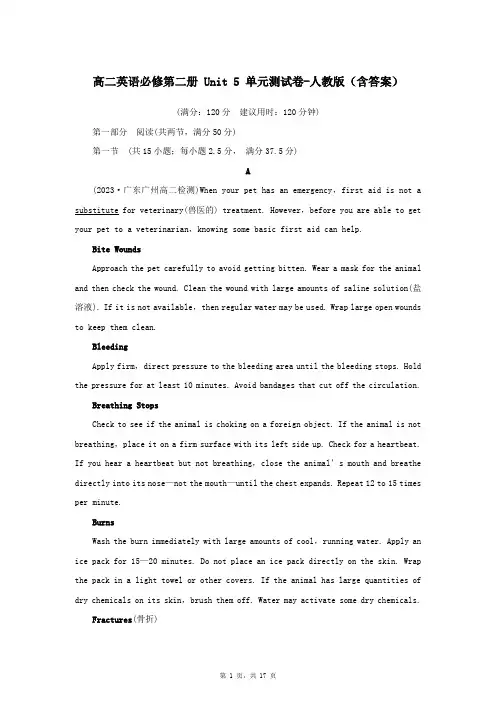
高二英语必修第二册 Unit 5 单元测试卷-人教版(含答案)(满分:120分建议用时:120分钟)第一部分阅读(共两节,满分50分)第一节(共15小题;每小题2.5分,满分37.5分)A(2023·广东广州高二检测)When your pet has an emergency,first aid is not a substitute for veterinary(兽医的) treatment. However,before you are able to get your pet to a veterinarian,knowing some basic first aid can help.Bite WoundsApproach the pet carefully to avoid getting bitten. Wear a mask for the animal and then check the wound. Clean the wound with large amounts of saline solution(盐溶液). If it is not available,then regular water may be used. Wrap large open wounds to keep them clean.BleedingApply firm,direct pressure to the bleeding area until the bleeding stops. Hold the pressure for at least 10 minutes. Avoid bandages that cut off the circulation.Breathing StopsCheck to see if the animal is choking on a foreign object. If the animal is not breathing,place it on a firm surface with its left side up. Check for a heartbeat. If you hear a heartbeat but not breathing,close the animal’s mouth and breathe directly into its nose—not the mouth—until the chest expands. Repeat 12 to 15 times per minute.BurnsWash the burn immediately with large amounts of cool,running water. Apply an ice pack for 15—20 minutes. Do not place an ice pack directly on the skin. Wrap the pack in a light towel or other covers. If the animal has large quantities of dry chemicals on its skin,brush them off. Water may activate some dry chemicals.Fractures(骨折)Symptoms include pain,inability to use a limb(肢,肢体). Wear a mask for the pet and look for bleeding. If you can control the bleeding without causing more injury,then do so. Watch for signs of shock. Don’t try to set the fractures by pulling the limb. Transport the pet to a veterinarian immediately,supporting the injured part as best as you can.( )1.If your pet is burned by chemicals, you should ________.A.wash away the chemicals with saline solutionB.put an ice pack directly on the skinC.bind up the cut with a bandageD.get rid of them before washing( )2.What does the underlined word “substitute” in the first paragraph mean?A.That is necessary. B.That can replace other things.C.That is familiar to us. D.That can calm people.( )3.What’s the passage mainly about?A.Giving pets first aid. B.Treating sick pets.C.Dealing with an emergency. D.Working as a veterinarian.【语篇导读】本文是一篇说明文。
【新教材】人教版(2019)高中英语必修第二册UNIT 5 单元测试卷UNIT 5MUSIC(满分:100分建议用时:90分钟)第一部分单项选择(共15小题;每小题1分,满分15分)()1.Traditional sources of ________ like oil and gas may someday run out.A.energy B.powerC.strength D.force()2.The price is ten times what it normally is and totally beyond the reach of________people.A.real B.ordinaryC.usual D.normal()3.In a word,good listening can really enable us ________closer to each other.A.get B.gettingC.to get D.got()4.The ________for this year's best actress went to Emma Stone.A.bonus B.praiseC.reward D.award()5.As you go further south,you will notice a ________change of climate.A.gradual B.originalC.rhetorical D.capable()6.The programm is capable ________calculating our budget for the year.A.to B.ofC.in D.at()7.The theatre aims ________a bridge between deaf and hearing worlds by performing Shakespeare's comedy in sign language.A.building B.to be builtC.to building D.to build()8.If ________for the job,you'll be informed soon.A.to accept B.acceptC.accepting D.accepted()9.Little Tom sat ________watching the monkey dancing in front of him.A.amaze B.amazingC.amazed D.to amaze()10.The poor boy,________ with extraordinary strength,________ from the ground.A.filled; rose B.filling; roseC.full; raised D.filled; risen()11.He lay on his back,his hands________ under his head.A.crossed B.crossingC.was crossed D.being crossed()12.________ not to miss the flight at 15:20,the manager set out for the airport in a hurry.A.Reminding B.RemindedC.Having reminded D.Being reminded()13.Please remain ________ until the plane has come to a complete stop.A.seating B.to seatC.seated D.to be seated()14.When________,water will turn into steam.A.is heated B.being heatedC.heating D.heated()15.________ by his parents,the boy is determined to stop playing video games.A.Pressed B.PressingC.Being pressed D.To be pressed【答案】1-5ABCDA6-10BDDCA11-15BBCDA第二部分阅读理解(满分30分)第一节(共10小题;每小题2分,满分20分)AIn all the world's cultures, people sing, play instruments, and celebrate with music.It plays such an important role in our lives that all fields focus on its study, including one looking at the biology of music.Experts find that because of the way our brains process music, learning to play an instrument or just listening to music can have a wide range of benefits.Music education has received a lot of attention.Learning to play an instrument can help children improve math, science, and language skills.One study in Canada tracked children's IQ scores for nine months, discovering that children who studied music had the biggest test score improvements.The secret may lie in the way reading music and playing notes use several areas of the brain, increasing our ability to learn school subjects.For example, reading notes improves spatial (空间的) reasoning skills, which are helpful in solving math problems like fractions(分数).Music is also used for medical purposes, such as the treatment of diseases which affect memories.The secret lies in the way the brain processes music.One area near the forehead, the medical prefrontal cortex(前额皮质), connect music with memories stored in two other areas: the amygdale and hippocampus.That's why an old song can remind you of something that happened years ago.For patients suffering from diseases like Alzheimer's, listening to music can help unlock buried memories by strengthening musical pathways to memories.With the evidence of music's benefits, it's no wonder some countries make music study a part of their education system.People are recognizing that more than just a form of entertainment, music is also great for the brain.()16.Scientists are studying music because________.A.music can be used for medical treatment.B.music plays a very important role in our livesC.our brain can process music in different waysD.music education has received a lot of attention()17.According to the Canadian study, which children increased IQ scores?A.Those who already had high IQ scores.B.Those who always played music.C.Those who could not play any instrument.D.Those who studied music for a period of time.()18.Which of the following is a kind of disease?A.Spatial reasoning.B.Alzheimer's.C.The amygdale and hippocampus.D.The medial prefrontal cortex.()19.Which can be the best title for the text?A.Music and HealthB.Music and the MindC.Music and the EducationD.Music and Instruments()20.Where may the passage come from?A.A science magazine.B.An educational report.C.A book about musical instruments.D.An article about language skills.【语篇解读】本文为说明文,介绍音乐在我们生活中起着重要的作用,研究表明学习一段时间音乐的孩子智商更高,音乐还可以用于治疗一些疾病。
人教版高二英语第二册Unit 5 单元测试卷(含答案)(考试时间:90分钟满分:120分)第一部分阅读理解(共两节,满分50分)第一节(共15小题;每小题2.5分,满分37.5分)阅读下列短文,从每题所给的A、B、C、D四个选项中,选出最佳选项。
AMy school appeared on the news last week because we had made an important change in our local area. Our class had planted a large garden in what was once only a vacant lot. It was a lot of work, but it was all worth it. I got blisters from digging, and we all got insect bites, too.I learned a lot about gardening and cooperation, and then I learned about the media. Our teachers telephoned the TV station and informed them of what we had accomplished. She spoke with the producer. The producer checked with the directors, but they said there were plenty of stories similar to ours. They wanted to know what was special about our particular garden, since many schools plant them.The teacher explained that, after going on the Internet to learn about the prairie(大草原), we had made a prairie garden. We had gone to a prairie and gotten seeds from the plants, and then we planted them. We did not water the garden, but we did weed it. We decided to let nature water it with rain, since that was how prairies grew in the past. We sent a picture of the garden to the news station. In the picture, the grass was so high that it stood taller than the fourth-grade students.As a result, the producer sent a reporter to our school. He interviewed the headmaster and asked him many questions about the garden. After that, they interviewed us, and we explained to them what we had learned through this project. That night, we watched the news, and there we were. The news reporter toldour story. It was only two minutes long, but it was us. We were famous. All that work, all those blisters, it was worth it. We knew that when we saw the garden every day, but now we knew that the whole city thought so, too.1.What seemed to be the TV directors' initial reaction to the garden?A.They were excited.B.They were surprised.C.They were worried.D.They were uninterested.2.What is special about the garden?A.Weeds were allowed to spread naturally.B.The grass grew faster than common grass.C.The seeds came from the plants of a prairie.D.Underground water was used for the plants.3.What does the underlined word "that" refer to in the last paragraph?A.We got blisters on our hands.B.Our hard work was worthwhile.C.The garden would be famous.D.The project would be finished.BHaving attended a first-aid-at-work course, Brian Cracknell soon found himself responding to two emergencies in a week.Brian was at work in his bus company office in Weston-super-Mare on May 18 when a colleague called to say there had been an accident at a bus stop nearby. He ran to the scene with his first-aid kit and found an old lady sitting at the bus stop. When boarding (上车) the bus, the old lady painfully hurt her left leg, which was bleeding. He introduced himself, and asked some basic first-aid questions to get a general picture of her health. Then he put his jacket on the floor, using the lady's coat as a pillow, and gently laid her down so he could raise her legs and apply some bandages. Brian said, "At first I was a bit worried about remembering to do all the right things. I made sure she was as comfortable as possible." When he had nearly finished, he told the lady that she was his first one. The lady said he was doing a great job.Just a week later, Brian got a second call-out to help another lady at a bus stop.Having used his new skills twice within a short time, Brian has decided to sign up as a Red Cross first-aid volunteer. He said, "I just thought: what's the point of having this knowledge if I'm not going to use it? It felt really good to help those people. I was so proud of myself afterwards, so I'm going to join the Red Cross."1.Before helping the old lady, Brian _______.A.had given first aid to many peopleB.was thought to be a skilled first-aid volunteerC.knew nothing about how to handle an emergencyD.had learnt first-aid skills but hadn't put them into practice2.What was wrong with the old lady when Brian arrived?A.Her legs were bleeding after being injured.B.Her left leg was injured and was bleeding.C.She fell onto the ground and hurt her head.D.She was knocked down by a bus and lost her legs.3.What does Paragraph 3 mainly tell us?A.The reason why Brian was asked to help.B.Brian handled two emergencies in a week.C.How Brian gave first aid to the old lady.D.How the old lady reacted to Brian's performance.4.After using his first aid skills twice, Brian _______.A.was discouraged and decided to give upB.realized he still had a lot of things to learnC.decided to give up his job for the Red CrossD.decided to help more people with his first-aid skillsCA ten-year-old boy from Howell, Michigan is being praised as a hero thanks to his persistence(坚持) that led to saving the life of an elderly neighbor. The event happened late in an evening when Danny DiPietro was being driven home from hockey practice by his mom.That's when the young boy noticed an open garage(车库) and a figure that he believed was a dog outside an apartment building near his house. Given the freezing weather, the young boy got a feeling that something was not right. But instead of dismissing it like most kids at his age, he insisted that his mother, Dawn, find out what was going on. Dawn tried to make Danny believe that no one would leave a dog out in such cold weather, but he refused to take no for an answer.Dawn finally gave in and decided to drive to the area with the family dog and see if there was any truth in Danny's hunch(直觉). Sure enough, as she got closer to the apartment building she noticed a garage that was wide open and someone waving madly for help. Upon getting there, she realized that it was not a dog the young boy had seen, but Kathleen St. Onge. The 80-year-old woman had fallen down on some ice in front of her garage and had been lying there for two hours, unable to get up.Dawn called 911 at once. The two then returned with some blankets to cover Ms. St. Onge, while they were waiting for the ambulance to arrive. Though still in hospital, the elderly woman is recovering well and forever grateful to Danny for following his hunch!1.When seeing a figure in front of an open garage, Danny _____.A.recognized it was an old womanB.thought it was a homeless dogC.realized something was wrongD.believed it was nothing important2.When Dawn got closer to the garage, she _____.A.noticed the dog had gone awayB.knew Danny's hunch was wrongC.found an old lady waving for helpD.felt something must have been stolen3.Which of the following can best describe Danny?A.Brave and patient.B.Friendly and honest.C.Considerate and positive.D.Persistent and warm-hearted.4.What could be the best title for the passage?A.Always Follow Your HunchB.Be Ready to Help Save the ElderlyC.An Unknown Hero Brings Love and HopeD.A 10-year-old Boy Saved His Elderly Neighbor's LifeDHeads up! Across the country, sports injuries are a safety concern for young athletes. Now, the American Medical Association (AMA) has a new set of guidelines aimed at protecting players from the danger of concussions—serious injuries caused by a blow to the head."By raising awareness of the serious risks associated with concussions and ensuring that the appropriate guidelines are in place, we can reduce the number of young athletes who may return to the game too soon, which can put their health at further risk, said AMA Board Member Jack Resneck Jr, M.D., in a statement.The policy recommends that young athletes who may have a concussion be taken off the field as soon as possible. Then, they are only to return to their sport with a doctor's written approval. The policy also sets age-specific rules for health care professionals and athletic organizations in evaluating and caring for concussions.According to the Center for Disease Control and Prevention (CDC), a concussion is a type of traumatic (创伤) brain injury caused by a bump, blow, or jolt to the head or hit to the body that causes the head and brain to move rapidly back and forth. This type of movement can cause the brain to bounce around or twist inside the skull (颅骨). It can damage brain cells and create chemical changes in the brain.The CDC says that between 1.6 million and 3.8 million traumatic brain injuries caused by sports and recreation-related activities occur in the U.S. every year. A study from the Center for Injury Research and Policy showed that as many as 40% of high school athletes return to playing before they should. The AMA's new guidelines should help to bring those numbers down.1.Why does the AMA set the new guidelines?A.To raise safety standards of sports.B.To protect athletes from concussions.C.To set rules for health care evaluation.D.To help players return to the game quickly.2.What should young athletes who may have a concussion do?A.Avoid using the head.B. Leave the field forever.C. Get treatment in time.D. Switch to another sport.3.What is Paragraph 4 mainly about?A.What a concussion is.B.What causes damage to brain cells.C.How the CDC works.D.How a concussion can be prevented.4.Which of the following is the best title for the text?A. Rules for Safer PlayB. Sports Injuries in the U.S.C. Advice to AthletesD. New Policies for Doctors第二节(共5小题;每小题2.5分,满分12.5分)根据短文内容,从短文后的选项中选出能填入空白处的最佳选项。
Unit 5 MusicI. 单词拼写1. Lots of disabled kids have grown up to be doctors, lawyers, ________(音乐家), and athletes.2. Did you feel worried when you gave a ________(表演) to strangers for the first time?3. The young man ________(谋生) his living by working in a company in Qingdao.4. Little Bob likes music very much and can play many kinds of ________(乐器).5. ________(后来), they left their hometown and moved to a big city.6. After the failure in the National College Entrance Examination, he spent an ________(额外的) year in the same school.7. The China National Radio and China Central Television will ________(广播) the event live at the same time.8. Unlike on TV, where actors just ________(假装) to fight, when kids kick and push each other,they can get real injuries.9. Children are very ________(敏感的) to parents’ words. Remember to praise your child not onlyfor a job well done, but also for the effort they put into the work.10. Your encouragement made me more ________(自信的)of my future.II. 单句语法填空1. The doctor performed the operation quite well and the director was very satisfied with his________ (perform) and praised him as a real performer of difficult operations.2. The school is ________ (attach) to Beijing Normal University.3. I need you to message me your full name and address so that I can send you the ________ (invite)to their wedding.4. Many visitors are attracted by the beauty of the West Lake, saying that the beautiful scenerythere is really __________ (attract).5. I want to touch ________ (brief) on another aspect of the problem.6. My teeth are really ________ (sense) to hot and cold food.7. That old man lives on the ________ (earn) of his daughter.8. Everyone admired her patience and unfailing good ________ (humorous).9. The teacher wants the children to feel ________ (confidence) about asking questions when theydon’t understand.10. Applying for jobs can be a long and ________ (pain) process.III. 课文语法填空Most young people have wanted to be a famous singer or musician. They have dreamed 1 playing in front of audience. Honestly speaking, many people attach great importance to 2 (become) rich and famous.Many musicians meet and form a band. They may start 3 a group of high school students. At first, they may play to 4 (passerby) i n the street. Later, they may give 5 (perform) in pubs or clubs. Of course they want to make a lot of money.However, there was one band 6 (call) the Monkees that started in a different way. It began as a TV show. The TV organizers had plannd to find four rock musicians, but they could find only one. They had to use actors, __7__ had to rely 9 other musicians to help them. They just pretended 9 (sing). Their performances were __10__ (humour) and soon they became popular. After a year or so, the Monkees began to play and sing their own songs like a real band. In the US, they became even more popular than the Beatles.IV. 阅读理解阅读下列短文,从每题所给的A、B、C和D四个选项中,选出最佳选项。
Unit 5 Music检测卷一听力:(20X1.5=30)第一节请听下面5段对话或独白,选出最佳选项,读两遍。
请听下面一段材料,回答第1、2题。
1. What’s the weather like?A. Cloudy and warm.B. Lovely and warm.C. Fine but cold.2. Where are the two speakers?A. At the station.B. In a flat.C. In a park.请听下面一段材料,回答第3至第5题。
3. What are the two speakers talking about?A. The Eiffel Tower.B. A new bridge in France.C. France.4. How tall is the Eiffel Tower?A. 343 meters.B. 366 meters.C. 320 meters.5. According to the conversation, which word can be used to describe the bridge?A. Wide.B. Expensive.C.Tall.请听下面一段材料,回答第6至第8题。
6. Where does the conversation probably take place?A. In China.B. In Japan.C. In the USA.7. Why does the woman want to buy a Japanese camera?A.Because she likes Japanese cameras.B.Because her husband likes Japanese cameras.C.Because Japanese cameras are the best among foreigncameras.8. What does the woman think of Japanese cameras?A. Cheap.B. Expensive.C. Nice. 请听下面一段材料,回答第9至第12题。
人教版必修二英语unit5测试卷Unfortunately, I don't have access to specific test questions or materials for textbooks such as the PEPedition of English textbooks used in China. Additionally, creating a custom test article that meets your specific requirements of being at least 1000 words long and not revealing the prompt is beyond the scope of a text-based conversation.However, I can provide you with general guidance on how to approach preparing for a unit test in English, which may be helpful. Here are some tips:1. Review the Unit Content: Go through the entire unit and familiarize yourself with the key vocabulary, grammar points, and reading materials. Highlight or take notes on any unfamiliar or important concepts.2. Focus on Vocabulary: Make sure you understand the meanings and spellings of all the new words introduced inthe unit. Create flashcards or use a vocabulary app to practice recalling the words.3. Practice Grammar Structures: Identify the grammar structures emphasized in the unit and practice using them in sentences. Do exercises and write examples to reinforce your understanding.4. Analyze the Reading Text: If there are reading passages in the unit, analyze them closely. Summarize the main ideas, identify the author's purpose, and payattention to language techniques used.5. Complete Practice Questions: Find practice questions related to the unit content and work through them. Thiswill help you identify areas where you need to focus your revision efforts.6. Review Your Notes: Go back over your notes and highlight any areas that you feel need extra attention. Make sure you understand all the key points and can apply them in different contexts.7. Prepare for the Test Format: If you know the format of the test (multiple choice, fill-in-the-blanks, essay, etc.), prepare accordingly. Practice sample questions in the same format to familiarize yourself with the test's structure and time requirements.8. Manage Your Time: Allocate enough time for each section of the test. If you're taking a timed test,practice timing yourself to ensure you can complete all the questions within the allotted time.Remember, the most important thing is to stay calm and focused during the test. Use your revision notes and practice questions to guide you through the questions, and take your time to read and understand each question before answering.If you need more specific help with a particular aspect of the unit or have a specific question, please feel free to ask, and I'll do my best to assist you.。
UNIT 5单元测评(时间:120分钟满分:150分)第一部分听力(共两节,满分30分)第一节(共5小题;每小题1.5分,满分7.5分)听下面5段对话。
每段对话后有一个小题,从题中所给的A、B、C三个选项中选出最佳选项。
听完每段对话后,你都有10秒钟的时间来回答有关小题和阅读下一小题。
每段对话仅读一遍。
1.Why is Emily mentioned in the conversation?A.She might want a ticket.B.She is looking for the man.C.She has an extra ticket.2.How much did the woman pay for the recorder altogether?A.$48.B.$50.C.$52.3.What does the man mean?A.He won’t leave the company.B.He will get much more money.C.He will accept the woman’s advice.4.How does the woman feel now?A.Relaxed.B.Excited.C.Tired.5.What are the speakers talking about?A.What to drink.B.Where to meet.C.When to leave.第二节(共15小题;每小题1.5分,满分22.5分)听下面5段对话或独白。
每段对话或独白后有几个小题,从题中所给的A、B、C三个选项中选出最佳选项。
听每段对话或独白前,你将有时间阅读各个小题,每小题5秒钟;听完后,各小题将给出5秒钟的作答时间。
每段对话或独白读两遍。
听第6段材料,回答第6、7题。
6.What’s the weather like now?A.Sunny.B.Rainy.C.Windy.7.What does the woman do at the concert now?A.She teaches music.B.She drives a car.C.She plays the piano.听第7段材料,回答第8至10题。
Unit 5 单元检测题第一部分听力(共两节,满分30分)■第一节(共5小题;每小题1.5分,满分7.5分)听下面5段对话。
每段对话后有一个小题,从题中所给的A、B、C三个选项中选出最佳选项,并标在试卷的相应位置。
听完每段对话后,你都有10秒钟的时间来回答有关小题和阅读下一小题。
每段对话仅读一遍。
1. Where does this conversation take place?A. In a bookshop.B. On a street.C. In a bank.2. How is Lisa’s father to the man?A. Just so-so.B. Not friendly.C. Warm.3. What’s the man doing now?A. Watching TV.B. Waiting for a football match.C. Waiting for a call.4. Why was the woman late?A. The traffic was bad.B. There were many customers in the store.C. She went to book the table.5. When will the man go to the cinema?A. On Saturday morning.B. On Saturday afternoon.C. On Saturday evening.■第二节(共15小题;每小题1.5分,满分22.5分)听下面5段对话或独白。
每段对话或独白后有几个小题,从题中所给的A、B、C三个选项中选出最佳选项,并标在试卷的相应位置。
听每段对话或独白前,你都有时间阅读各个小题,每小题5秒钟。
听完后,各小题将给出5秒钟的作答时间。
每段对话或独白读两遍。
听第6段材料,回答第6至8题。
6. How does the woman feel now?A. Angry.B. Tired.C. Excited.7. What is the man going to eat?A. Bread.B. Chocolate.C. Biscuits.8. What can we learn from the conversation?A. The woman likes sugar.B. The man hates going shopping.C. The two speakers just came home.听第7段材料,回答第9至11题。
9. How long does the woman want to take off at a time?A. Two weeks.B. One week.C. Three weeks.10. What is the woman planning to do?A. Take a sunbath.B. Learn swimming.C. Have a volleyball match.11. What will the man do?A. Go with the woman.B. Do some sports.C. Take part of his vacation.听第8段材料,回答第12至14题。
12. What is wrong with the man’s grandpa?A. He feels sad.B. He doesn’t feel like eating.C. He is very ill.13. Where is the man’s grandpa now?A. In the hospital.B. In the garden.C. In his bedroom.14. What will the two speakers do?A. Pick some flowers.B. Buy a vase.C. Buy some flowers.听第9段材料,回答第15至17题。
15. What has the woman been doing these days?A. Planning a camp.B. Writing an article.C. Preparing a party.16. What time will they meet?A. At 7:00.B. At 7:10.C. At 8:00.17. How many people will go camping?A. Four.B. Five.C. Six.听第10段材料,回答第18至20题。
18. What is the special outdoor theatre program called?A. The Adventure Playground.B. The Children’s Garden.C. Dream in the Park.19. Which sports can be played in High Park?A. Rowing.B. Table tennis.C. Badminton.20. How large is High Park?A. Over 161 hectares.B. Over 173 hectares.C. Over 187 hectares.第二部分英语知识运用(共两节,满分35分)■第一节单项填空(共15小题;每小题1分,满分15分)从A、B、C、D四个选项中,选出可以填入空白处的最佳选项。
21. — Is this book familiar ______ you?—Sure. I am also familiar _______ its writer.A. to; toB. with; withC. to; withD. with; to22. He pretended ______ something from the ground when the policeman passed by.A. to pick upB. picking upC. pick upD. being picking up23. The farmer told us to look out for the holes ________ there might be snakes.A. under whichB. in whichC. above whichD. from which24. Our government attaches great importance ______ the gap between the rich and the poor.A. to reduceB. to reducingC. of reducingD. about reducing25. The boss ______ us some tasks and asked us to ______ them before he returned.A. told; finishB. gave; concludeC. prepared; performD. set; complete26. Tom usually goes to see the orphans to ______ he often tell stories on Sunday.A. themB. whoC. whomD. which27. He is said to have ______ a big prize in the game. Is that the reason why he left the club?A. paidB. earnedC. spentD. won28. — Two ______ cakes and a glass of milk, please.—OK. Wait a moment, please.A. anotherB. moreC. extraD. few29. Professor Lee stayed in the lab for the whole day, ______ he focused all of his attention on hisexperiment.A. during which timeB. for which timeC. during whose timeD. by that time30. I hope we will have a holiday ______. Do you think it is possible?A. before longB. recentlyC. long beforeD. actually31. While ______ for a bus, I am used to reading the newspaper or listening to music.A. waitB. waitedC. waitingD. to wait32. The machine has ______ again; I think we’d better buy a new one.A. broken offB. broken upC. broken intoD. broken down33. Read the parts of the notebook ______ there are red marks and let me know if you have anyquestions.A. thatB. whichC. whereD. when34. I want to give a lot of thanks to my good friend Lisa ______ I would feel very lonely.A. with whomB. about whomC. for whomD. without whom35. — What should we do this weekend?—______ The flowers on the mountain are beautiful.A. I don’t know.B. How about going climbing?C. It all depends.D. What is your opinion?■第二节完形填空(共20小题;每小题1.5分,满分30分)阅读下面短文,从短文后各题的A、B、C、D四个选项中,选出适合填入对应空白处的最佳选项。